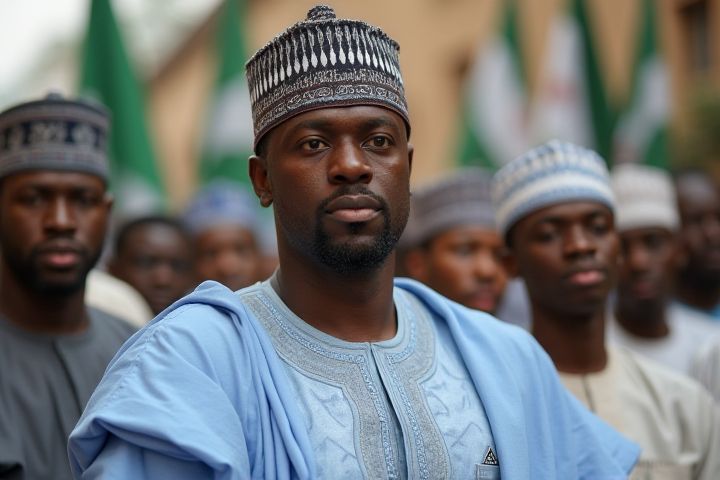
Nigeria's political landscape is characterized by its federal structure, comprising 36 states and the Federal Capital Territory. The country operates a multi-party system, where the two dominant parties are the All Progressives Congress (APC) and the People's Democratic Party (PDP). The political environment is often influenced by ethnic diversity, with over 250 ethnic groups, resulting in a complex interplay of regional interests and national policies. Corruption and electoral violence are significant challenges, impacting governance and public trust. Engaging in political processes, like voting or advocacy, is crucial for you to help shape Nigeria's future and ensure accountability.
Federal system of government
Nigeria's political landscape is characterized by a federal system of government, which divides power between the central authority and various states. This structure allows for diverse governance, accommodating over 250 ethnic groups and their distinct cultural practices. Elections, held at both state and federal levels, play a crucial role in shaping policies that address local needs while adhering to national interests. Understanding this intricate system is essential for participating effectively in Nigeria's democratic processes.
Multi-ethnic society
Nigeria's political landscape is shaped by its diverse multi-ethnic society, comprising over 250 ethnic groups, with the Hausa, Yoruba, and Igbo being the largest. This rich tapestry of cultures influences governance, as various ethnic interests and identities vie for representation and power. The federal system allows for regional autonomy, which helps accommodate the demands of these groups while also posing challenges in terms of national unity. Understanding Nigeria's political dynamics requires recognizing how ethnicity intersects with political parties, electoral processes, and policy-making.
Oil-driven economy
Nigeria's economy is heavily reliant on its oil sector, which accounts for a significant portion of government revenue and foreign exchange earnings. The country is one of Africa's largest oil producers, with the Niger Delta region housing vast oil reserves, attracting both foreign investment and domestic policy debates. This oil dependency has consequences, leading to socio-economic issues such as corruption, environmental degradation, and regional disparities. Understanding the intricate relationship between politics and the oil industry is essential for grasping Nigeria's development challenges and opportunities.
Corruption challenges
Corruption is a pervasive issue in Nigeria, significantly impacting political stability and economic development. Government officials and institutions often engage in corrupt practices, leading to a lack of trust among the populace and hindering effective governance. Various anti-corruption agencies, such as the Economic and Financial Crimes Commission (EFCC), strive to combat these challenges but face numerous obstacles, including political influence and inadequate resources. Your awareness of these issues can help foster meaningful conversations about reforms necessary for a more transparent and accountable political landscape in Nigeria.
Influence of traditional leaders
In Nigeria, traditional leaders, often referred to as kings or chiefs, play a pivotal role in shaping political landscapes and influencing decision-making processes within their communities. These leaders possess a wealth of cultural knowledge and often hold significant sway over public opinion, serving as intermediaries between the government and the local populace. Their authority extends beyond ceremonial functions, as they engage in mediating conflicts and fostering community development initiatives, thereby enhancing social cohesion. Understanding the influence of traditional leadership is essential for grasping the complexities of Nigeria's political dynamics and the interaction between modern governance and indigenous practices.
Two main political parties
In Nigeria, the political landscape is primarily dominated by two main parties: the All Progressives Congress (APC) and the People's Democratic Party (PDP). These parties represent divergent ideologies and regional interests, influencing governance, policy-making, and electoral dynamics. The APC, founded in 2013, emphasizes economic reform and anti-corruption efforts, while the PDP, established in 1998, often champions social democracy and inclusive governance. Voter behavior and party allegiance are significantly shaped by issues such as ethnicity, religion, and economic conditions, making Nigeria's political scene complex and multifaceted.
Youth involvement in politics
Youth involvement in Nigerian politics has gained significant momentum, reflecting the increasing awareness and activism among younger generations. Organizations such as Not Too Young To Run advocate for the inclusion of youth in governance, seeking to lower the age limit for elected positions. With a demographic majority, Nigerian youth contribute to shaping political discourse through social media, protests, and grassroots movements. Engaging young voters and addressing their concerns is essential for the future of democracy in Nigeria, as it fosters a more inclusive political landscape.
Security concerns
In Nigeria, security concerns dominate the political landscape, significantly impacting governance and citizen well-being. Issues like terrorism, particularly from groups like Boko Haram, and widespread banditry challenge national stability and require urgent governmental response. The Nigerian government has implemented various strategies, including increased military presence in affected regions and community engagement initiatives, to combat these threats. You can observe how the interplay between security and politics shapes public policy, influencing everything from economic development to social cohesion across the country.
Electoral reforms
Electoral reforms play a crucial role in Nigeria's political landscape, aimed at enhancing transparency and credibility in the electoral process. Initiatives like the introduction of card readers and biometric voting systems have been implemented to reduce electoral fraud and improve voter participation. Legislative changes, such as the Electoral Act amendments, seek to address issues like vote buying and violence during elections. Engaging in these reforms can empower citizens to hold leaders accountable and foster a more democratic governance structure.
Regional power dynamics
Regional power dynamics in Nigeria significantly shape the nation's political landscape, with various ethnic groups and regional interests vying for influence. The political structure is characterized by a federal system that allocates power and resources among Nigeria's 36 states, highlighting the importance of local governance. Political parties often align themselves with regional affiliations, making coalition-building essential for national elections. Understanding these regional complexities can enhance your engagement in Nigeria's vibrant political discourse.
